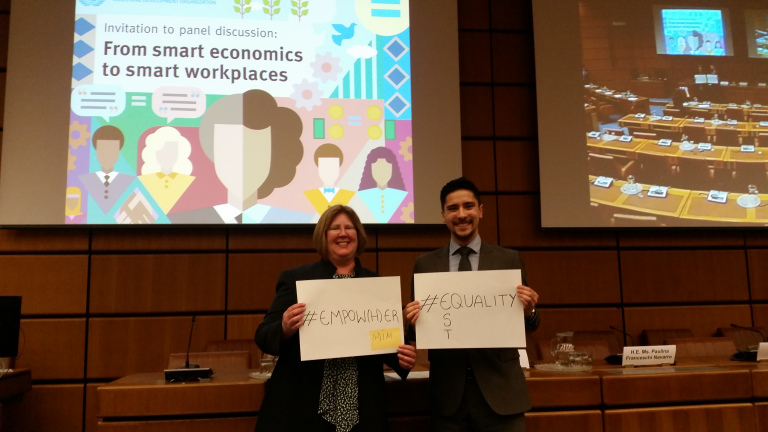
In celebration of this year’s International Women’s Day, the European Student Think Tank attended a panel discussion held by the United Nations Industrial Development Organization (UNIDO), entitled “From smart economics to smart workplaces”, at the United Nations Office in Vienna, on March 8, 2017. H.E. Paulina Franceschi Navarro, Permanent Representative of Panama to UNIDO moderated the discussion between H.E. Helen Eduards, Permanent Representative of Sweden to UNIDO; Lisa Kepinski, founder of the Inclusion Institute; and Jitka Schmiedova, Project Manager for Erste Bank People Services.
As the title of this event might already indicate, the discussion centred around the questions in what ways gender equality on the labour market might benefit the economy as a whole, therefore constituting smart economics, and how to empower women through the shaping of smart workplaces. Women make up around half of the globe’s entire labour force but still face unequal treatment in the formal labour market in form of persistent wage gaps, and hampered access to credit, technology, and education. As these issues lie at the very core of UNIDO’s mandate on inclusive and sustainable industrial development, it has set itself the goal of addressing these issues under its campaign titled “Planet 50-50 By 2030: Step It Up For Gender Equality”.
The panellists determined that the biggest challenges for women in the labour market come in form of existing stereotypes, and unreflective thinking among the prevailing management. Besides a persistent will to call for change, it therefore takes a bottom-down approach in form of a stronger legal framework put in place by national governments in order to address these challenges. These bottom-down measures must then be complemented by efforts to make workplaces smart. What does the term “smart workplace” mean though? Jitka Schmiedova defined it in two dimensions: On the one hand as a physical dimension, entailing a friendly working environment open to men and women alike, and on the other as a time dimension in line with modern work demands. This means that people ought to decide more flexibly on their individual working times Positive experiences of gender equality within the Swedish Foreign Service, which itself had to first undergo changes in this field, illustrate that equality for all within the labour market is achievable.

 The ’Ndrangheta’s Infiltration and Threat to European Institutions
The ’Ndrangheta’s Infiltration and Threat to European Institutions  From Paper to Practice: How Grassroots Norms Undermine Gender Rights in Pakistan
From Paper to Practice: How Grassroots Norms Undermine Gender Rights in Pakistan  Exploited Childhoods: The Role of Global Corporations in Perpetuating and Mitigating Child Labour
Exploited Childhoods: The Role of Global Corporations in Perpetuating and Mitigating Child Labour  Human Rights Challenges in Addressing SLAPPs in Media, NGOs and Journalism in the EU
Human Rights Challenges in Addressing SLAPPs in Media, NGOs and Journalism in the EU 


